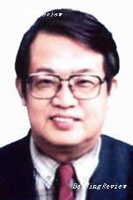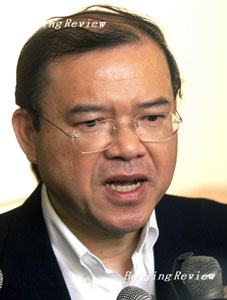|
China, as the biggest developing country and a trade giant in the world, plays an important role in the global trade system. Because of this dual identity, the country is under the global spotlight. Both WTO Director General Pascal Lamy and U.S. Trade Representative Susan Schwab visited Beijing recently to exhort its leaders to strengthen their efforts toward a successful conclusion of the current Doha Round of trade negotiations and play a bigger role in reviving the world's multilateral trade system. Many believe China can help to restart the talks, which were suspended in July. Several experts give their views of the relationship between China and the Doha Round.

Zhou Shijian, the Standing Councilor of the China Society for World Trade Organization Studies
Why did Susan Schwab come to China? Why did Pascal Lamy come to China? They came for one purpose: to persuade China to exert its influence on the resumption of the Doha Round.
Different from its peers among developing countries, China is not reliant on agriculture for its economic growth and export revenue. Therefore, it has a smaller stage in agricultural negotiations of the Doha Round. Besides, China is both a developing country and a trade giant. It has a perfect understanding of how other developing countries and developed countries feel in the talks. Due to this unique status, China can work as a bridge and communicator between the developing and developed world.
If China plays this unique role in saving the Doha Round, it will have its status in the international community further proved.
To revive the talks, China can press the United States and the EU to compromise, and in the meantime, it can coordinate the opinions of other developing countries, to finally achieve a balance of interests among all the participants.

Jeffrey J. Schott, Senior Fellow of the Institute for International Economics, Washington, D.C.
China has been a constructive but low-key participant in the Doha Round of multilateral trade negotiations in the WTO. It has played a useful role in advancing the negotiating process through its membership in the G-20 coalition of developing countries.
That said, China's low profile in the WTO talks is not befitting its status as one of the world's largest economies and trading nations. It has not offered additional reforms beyond the extensive commitments undertaken in its 2001 protocols of accession, and deserves blame—along with other major trading nations—for the current impasse in the talks. China has an important stake in a well-functioning multilateral trading system—that's why it spent so much effort to join the WTO and why it needs to take a more active leadership role in reviving the Doha Round.
What needs to be done? First, China should work closely with other major trading nations to ensure that the WTO talks re-engage and progress. To that end, China should offer improved access to its markets by cutting its tariffs on non-agricultural goods by a half from the current applied rates and liberalizing trade and investment in the financial and other service sectors. This is not as onerous as it sounds. China is in a position to contribute more than other developing countries to the final Doha Round accord. Because China's trade barriers are already low compared with other developing countries such as India and Brazil, large percentage cuts in base tariff rates will translate into small changes in China's applied tariffs. Such action could yield important dividends: It would allow China to respond positively to protectionist pressures in Europe and the United States, and would reinforce Chinese economic and political relations with other developing countries in the WTO.

Supachai Panitchpakdi, Secretary General of the United Nations Conference on Trade and Development
China alone may not [be able to revive the Doha Round of negotiations]. I think the solution should be the collective [efforts] of [many] countries.
In the past, you could have some key countries pushing for the end of the round, but not these days. You need a collective push and collective [sharing] of responsibility.

Daniel Esty, Director of the Yale World Fellows Program
China has a potentially critical role to play in making the international trading system work to the advantage of all nations—and no country benefits more from open markets than China. China needs to step up to the leadership position that it aspires to fill in many respects. In the context of the Doha Round, China could emerge as a critical mediator, helping to bridge the gaps between the United States and Europe and the developed and developing worlds.
But China also needs to accept that those who receive benefits from global cooperation must share in the burdens of providing "global public goods." In this regard, China's role as a bystander in the worldwide effort to reduce greenhouse gas emissions and address other global scale environmental [problems] is increasingly untenable. If China is to be seen as a leader, it must be prepared to pay its fair share (which, indeed, will be substantial) of the costs of addressing climate change and other issues involving trans-boundary harm. While China has many poor people and must prioritize addressing their plight, poverty can no longer be accepted as an excuse. China has great wealth today and must therefore be prepared to contribute financially and otherwise as a middle-income country (of great size) to global problem solving.
China, more than any other country, will gain from the ongoing trade liberalization and risk a serious economic slowdown from its failure. So China should use all of its diplomatic and economic strength to lean on the European nations to make compromises sufficient to restart the stalled talks.
(Wang Yanjuan and Chen Wen contributed reporting for this article from New York)
| 